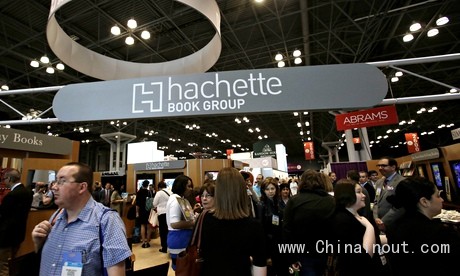
一本电子书应该值多少钱?这些钱是怎样分配的?这两个问题似乎是出版行业之间激起的争论的焦点。这场结束的争论会给读者,作家,出版商,书商带来怎样的持续的反响呢?
这场争论的激起是因为英国阿歇特出版公司(世界上最大的出版商之一)以及亚马逊(世界上最大的图书零售商在)之间的谈判引起的。据大家所说,争论的触发点是谁控制电子书的
价格。在这个相同的话题上这样的冲突并不是第一次发生。在2010年,和苹果公司合作的五大出版商之一阿歇特提高了电子书的价格迫使苹果这个电子零售商推行新的盈利模式。
迄今为止,电子书的销售就像印刷书的销售一样。出版商给了大约50%的批发价的折扣,零售商可以制定一个他们觉得合适的零售价格。他们可以打折出售书籍,但是他们也需要承受因此而带来的利润上的压力。根据新的计划,出版商需要将书的价格告诉零售商,而零售商要求的折扣则降到了30%,使得零售商再对书进行打折这种事是不可能的了。这样就造成消费者需要掏更多的钱买书,出版商要花更多的钱出书,对零售商而言则没有什么控制。
美国司法部门介入调查,发现了勾结和价格操纵的证据,于是这种模式就被消除了。现在出现的是前两种模式的奇怪的融合。出版商定价和制定折扣继续,但是给零售商的折扣仍然控制在30%以内。
根据先前的批发的模式,出版商把一本电子书的定价为14.99美元,并且有给零售商的50%的折扣,那么像亚马逊那样的在线零售商就可以对该电子书打折,给消费者9.99美元这样一个更合理的价格。消费者会期待电子书的价格会少于他们通常所熟悉的纸质书的价格。但是如果根据新的折扣率,亚马逊还以原来的价格售出电子书的话,那么它一定会赔钱。而出版商,对于降低制定的给零售商的折扣这样的事情也会缺乏热情。
像阿歇特这样的公司却足以让人艳羡。它能制定较高的电子书价格(保护它和大型书商之间的关系),并且依靠亚马逊削减利润来改变电子书的数量。这种新的情况就制造了意想不到的事情:曾经一直抱怨亚马逊的折扣措施的作者开始抱怨亚马逊的折扣给的不够。在这场两大公司的谈判中,来自阿歇特的一方指控亚马逊通过提供和出版商自身制定的相似的情况来提升价格。
展现在投资商面前的情况是,阿歇特公司已经声明把控制电子书价格当成是它的首要目标。但是上一周这种习惯性的平静被打破了,来自亚马逊的代表方认定谈判的导火索就是价格。
所以双方都认为它们正处在危急当中。历史表明亚马逊认为电子书花费不能超过9.99美元。和亚马逊签订协议的自行出版的作家支持制定的协议,即如果电子书的价格超过了9.99美元的话,那么给作者支付的提成率将会减半,而阿歇特则更乐意让电子书的价格达到14.99美元甚至更高,那么亚马逊可以定任何折扣,同时消费者的负担也就重了。
在这样的许多的争论之中,媒体的造势也通常是片面的。像Stephen Colbert或者是James Patterson这样的阿歇特专职作家都要求亚马逊和阿歇特真诚的谈判,尽管并不能说清哪一方要求过高,或者谁是公正的或不公正的。上周,当读者和不知名的作家给予了有站在哪一方的能力时,结果是他们压倒性的站在亚马逊的一边, 到目前为止要求改变的请愿书签名已经达到了5000个左右。在这种僵持情况下最理想的结局会是怎样的呢?作为其中的一个结果那就是改革。我们中的许多人都希望看到阿歇特专职作者所承受的痛楚将会立刻结束。
最简单和最公平的做法就是让阿歇特停止坚持电子书定价超过9.9美元的想法。高的电子书定价伤害的不仅仅是每位读者,而且损失到一定的读者人数。而阿歇特的作者的书的销量下降也正是由于缺乏竞争力的定价所造成的。有了合理的价格,阿歇特就能增加部门,而亚马逊就能赚取利润,而这些利润并不会让消费者承受重大的经济负担,与此同时,亚马逊也不用不得不打折扣来赚取利润了。
How much should an ebook cost? And how should that money be split? These two questions seem to be at the centre of a debate ripping through the publishing industry. How this debate plays out could have lasting repercussions for readers, writers, publishers, and booksellers. The debate arose as negotiations between Hachette Book Group – one of the largest publishers in the world – and Amazon, the largest book retailer in the world, began to falter. By all accounts, the sticking point is over who controls the price of digital books. It isn't the first time this clash has occurred over the very same issue. In 2010, Hachette was one of the five publishers that worked with Apple to raise the price of ebooks and force digital retailers onto a new profit model.
Hitherto, ebooks were sold much like print books. Publishers gave a wholesale discount of around 50%, and retailers could set the list price however they saw fit. They could discount the book, but they would take the hit on profits alone. Under the new plan, publishers would dictate the price to the retailer and the retailer's cut would be reduced to 30%, making discounting impossible. This resulted in higher prices for consumers, more money for publishers, and no control for retailers.
The United States Department of Justice stepped in, found evidence of collusion and price-fixing, and this model was dismantled. What emerged in its place has been a strange amalgamation of the two former models. Wholesale pricing and discounting resumed, but the discount provided to retailers remained in the neighborhood of 30%.
Under the previous wholesale model, publishers might price an ebook at $14.99 (£8.99), and with the 50% discount, an online retailer like Amazon was able to discount to a more reasonable $9.99 to serve customers. Customers who expect digital books to cost less than the paperbacks with which they were familiar. With the new discount rate, Amazon stood to lose money by offering that same price. Publishers, meanwhile, were less than enthusiastic about lowering the offered wholesale discount.
Publishers like Hachette now found themselves in enviable territory. They could price ebooks high – protecting their relationship with high-street booksellers – and rely on Amazon to cut their own margin to the bone in order to move quantities of ebooks. This new situation created the bizarre scenario wher authors who once complained about Amazon's discounting are now complaining that they aren't discounting enough. And during these negotiations, parties from Hachette's side are accusing Amazon of raising prices by offering something close to what the publisher itself is setting.
In a presentation to investors, Hachette has stated as a primary goal the control of ebook pricing. Breaking their habitual silence just last week, a representative from Amazon confirmed that the sticking point in these negotiations is indeed price. So both sides have confirmed what's at stake. History would indicate that Amazon thinks ebooks should cost no more than $9.99. Their agreement with self-published authors supports this, as the royalty rate paid halves if the price exceeds this amount. Hachette, meanwhile, would very much prefer to offer ebooks at $14.99 or more and leave any discounting up to Amazon (or any pain up to their customers).
Amid these negotiations, a media campaign has erupted that has been almost entirely one-sided. Hachette authors from Stephen Colbert to James Patterson have demanded Amazon to negotiate in good faith, despite being unable to articulate what each side is demanding and who is being fair or unfair. When readers and lesser–known writers were given the ability to take sides late last week, they overwhelmingly came out on the side of Amazon, with a Change.org petition approaching 5,000 signatures as of this writing.
What is the ideal outcome in this standoff? Resolution, for one. Many of us would love to see the pain being suffered by Hachette's authors end immediately. The simplest and fairest way for this to happen would be for Hachette to stop insisting on ebook prices well north of $9.99. High ebook prices harm not only individual readers but readership in general. And Hachette's authors suffer from lost sales due to uncompetitive prices. With reasonable prices, Hachette could continue to move units, and Amazon would be able to earn the margin a retailer is owed by not having to discount for its customers at great sacrifice to itself.










